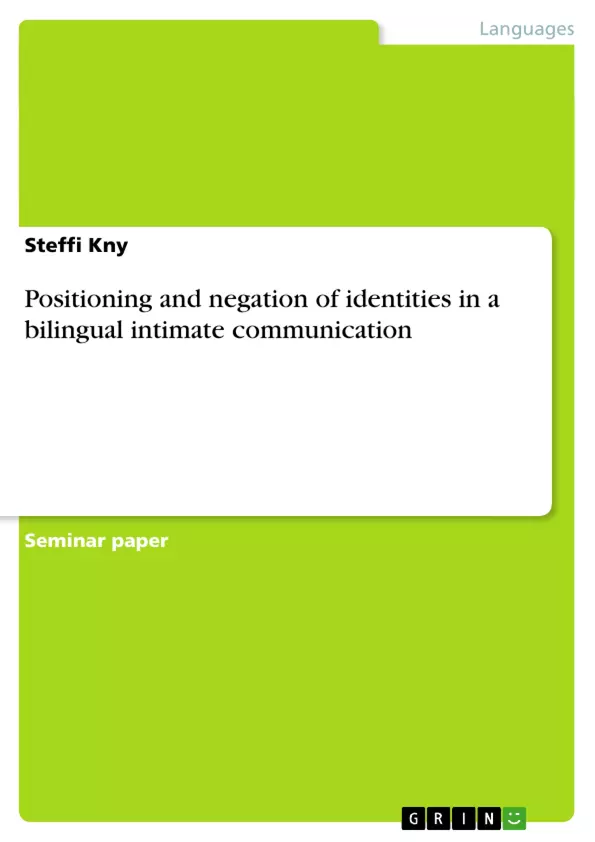Communication is an important aspect of an intimate relationship. It
becomes even more important when both partners do not have the same native language and one of both (or sometimes both when a lingua franca is used) has to express in a language s/he is not completely proficient in, and e.g. might not know all connotations of the meanings. The level of proficiency one has in a language is important for the identity that is established or, i.e. negotiated through communication.
The frame of this paper is based on the framework of positioning by Harré and Davies (1990) and it aims to apply ideas from this framework to data I gathered from an intimate bilingual conversation. Furthermore, an article by Piller (2000) aboutLanguage choice in bilingual, cross-cultural interpersonal communication,analyzing language choice in bilingual intimate conversations, specifically Anglo-German couples, and their reasons should be taken into consideration.
This article is organized as following: first, I will give an introduction into the notions of positioning, identity, negotiation of identity. It implies that identities “are constructed in and through discourse.” (Riley, 2006: 297). In a next step, I will take a closer look at the language choice in bilingual relationships, I will identify possible reasons for one language to be chosen, and compare these with my own experience being a German and having a relationship with an American. The last part consists in analyzing the transcript. I have two transcripts that I will take into consideration: one is in English, and the other one is in German. I aim to examine how the language choice determines the positioning of each of the communication partners, and consequently, what impact does the fact of being a native or a non-native speaker has on the identity. Moreover, I will look at the distribution of the dominant role, and if the native speaker is in the more dominant position merely because s/he is the more proficient speaker, or if there are other factors determine each positions.
Inhaltsverzeichnis (Table of Contents)
- Abstract
- Introduction
- Positioning and identity
- Communication in bilingual couples and language choice
- Transcript I: Conversation in German.
- Transcript II: Conversation in English.
- Summary
- References
Zielsetzung und Themenschwerpunkte (Objectives and Key Themes)
This paper explores the communication dynamics of a bilingual couple, analyzing their conversations through the lens of positioning and identity negotiation. The research aims to understand how language choice and native language proficiency influence the construction of individual and relational identities within the couple's interactions.
- Positioning and identity construction in bilingual communication
- Language choice and its impact on power dynamics and control in intimate relationships
- The influence of native language proficiency on identity formation and negotiation
- Analyzing the interplay between speaker identity and perceived identity in bilingual conversations
- Examining the factors that contribute to the dominant position of the native language speaker within the relationship
Zusammenfassung der Kapitel (Chapter Summaries)
- Abstract: This section provides a brief overview of the paper's purpose and methodology, highlighting the use of conversational transcripts to analyze positioning and identity negotiation in a bilingual couple.
- Introduction: This chapter introduces the concept of communication in intimate relationships, particularly focusing on the challenges of bilingual couples. It presents the framework of positioning by Davies and Harré (1990) and introduces Piller's (2000) work on language choice in Anglo-German couples.
- Positioning and identity: This chapter delves into the theoretical framework of positioning, explaining how individuals locate themselves and others within conversations. It discusses the concepts of interactive and reflective positioning, as well as the role of constraints and categories in shaping individuals' positions.
- Communication in bilingual couples and language choice: This chapter examines the communication dynamics of bilingual couples, particularly focusing on language choice and its implications for identity construction. It summarizes Piller's (2000) findings on language choice in bilingual couples and discusses the factors that influence this choice.
Schlüsselwörter (Keywords)
This paper focuses on the key concepts of positioning, identity negotiation, language choice, bilingual communication, intimate relationships, and the impact of native language proficiency on the construction and perception of identities.
Frequently Asked Questions
How does language choice affect identity in bilingual couples?
Language choice is a tool for negotiating identity. The language used can determine how a partner positions themselves—for example, as more competent, dominant, or culturally aligned—affecting how their identity is constructed and perceived.
What is "positioning" in communication theory?
Positioning, based on the framework by Harré and Davies, is the process through which individuals locate themselves and others within a discourse. It can be "interactive" (what others do to us) or "reflective" (how we position ourselves).
Does the native speaker always dominate the conversation?
Not necessarily. While higher proficiency can lead to a dominant role, other factors like personality, cultural background, and the specific context of the relationship also determine power dynamics.
What are common challenges in bilingual intimate communication?
Challenges include limited proficiency in the partner's language, lack of knowledge regarding cultural connotations, and the potential for identity negation when one partner cannot express themselves fully.
What is the role of native language proficiency in identity negotiation?
Proficiency impacts the ability to use subtle nuances and connotations. A non-native speaker might feel their "true" identity is restricted or altered when forced to communicate in their weaker language.
- Quote paper
- Steffi Kny (Author), 2006, Positioning and negation of identities in a bilingual intimate communication, Munich, GRIN Verlag, https://www.grin.com/document/68420



